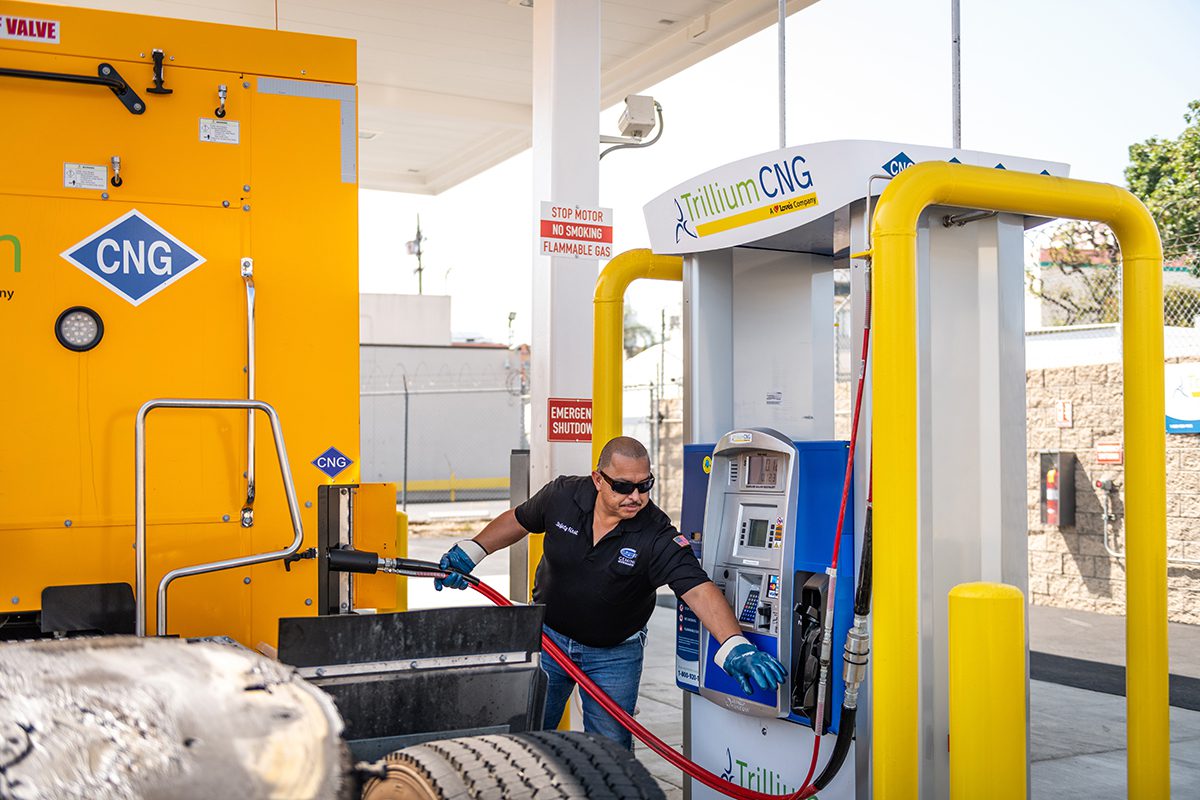With mounting environmental regulations and a focus on making progress towards corporate sustainability goals, fleet owners are making critical decisions about the future makeup of their fleet. Taking into consideration key factors such as total cost of ownership and application, fleets also need to evaluate broader implications such as the regulatory landscape at the federal, state, and even local level, infrastructure availability, and funding opportunities.
While the state of the clean transportation industry continues to rapidly evolve, we are looking at a few of the top concerns that fleet managers should be aware of for the year ahead.
New Engine Technologies Make Natural Gas Possible for More Fleets
Major manufacturers are announcing new natural gas engines that will provide exciting new options for fleets, particularly fleet types that are not well suited for electrification but need to diversify their fleet while making substantial emission reductions. Heavy-duty natural gas vehicles are proven to deliver power and performance comparable to diesel vehicles while producing lower overall amounts of regulated emissions including greenhouse gas (GHG) emissions, particulate matter and nitrogen oxides (NOx). The sustainability impact of natural gas is magnified when you factor in the use of low- and carbon-negative renewable natural gas (RNG).
All Eyes on California’s Developing Advanced Clean Fleets (ACF) Regulation
There are several policies at the state and federal level that could impact fleets operating traditional diesel vehicles. One of the most watched is the California Air Resources Board’s (CARB) proposed Advanced Clean Fleets (ACF) regulation. CARB’s ACF rule would require certain medium- and heavy-duty fleet types to transition to zero-emission technologies through a phased-in approach from 2024 through 2042, depending on the number of vehicles in their fleet and the sector of their operations.
Under the current guidelines, “high priority” private fleets subject to ACF can continue to purchase and operate natural gas vehicles if they choose the Zero-Emission Milestone compliance pathway and continue to meet certain zero-emission milestones, as determined by their vehicle group, until they reach 100% zero-emission vehicles.
National Funding Opportunities Expand for Natural Gas
For the first time in nearly a decade, the Alternative Fuels Tax Credit (AFTC), which benefits both propane and natural gas operators, was approved for a multi-year extension as part of the Inflation Reduction ACT (IRA). This provides a $0.50 per gasoline-gallon equivalent (GGE) tax credit for compressed natural gas (CNG) and a $0.36 rebate for propane fuel, plus an additional benefit of a 30% or up to $100,000 investment tax credit for infrastructure. Additionally, the proposed federal Renewable Natural Gas Incentive Act could create tax credits for dispensers of RNG used for transportation.
Although these incentives are beneficial to help generate a return on investment for deploying clean technologies, natural gas vehicles remain a mature and commercially available technology and demonstrate a positive total cost of ownership without incentives in many applications.
In California, two of the state’s largest grant funding programs, the air district-level Carl Moyer program, and the state-wide VW Program continue to offer funding up to $160,000 or $85,000 per natural gas vehicle, respectively. While California’s Carl Moyer Program will no longer support natural gas infrastructure projects, the forthcoming federal Charging and Fueling Infrastructure will have $700 million available-wide for natural gas, battery electric, and hydrogen fueling infrastructure projects.
Implementing Carbon-Negative Fuels to Reach Sustainability Targets
Increasingly, fleets across sectors are expected to not only set ambitious sustainability goals but now begin showing measurable progress towards meeting these goals. The greatest pressure remains focused on private, for-hire fleets to reduce or eliminate their greenhouse gas (GHG) emissions specifically (which, in turn, help reduce their customer’s supply chain emissions).
When fleets are evaluating the most ambitious emission reduction frameworks over the year ahead, they will most likely consider setting either a “net-zero target” or a “science-based target”. Regardless of the target, it’s important for fleets to understand that both frameworks will require setting and calculating a baseline and reducing GHG emissions by 80-100% by 2050.
Fleets that have achieved some emission reductions by implementing efficiency technologies are now evaluating more fundamental operational changes in order to make considerable progress towards meeting their goals. While efficiency is a first step, utilizing low- and negative-carbon renewable fuels, along with zero-emission vehicles, are essential for fleets to be able to reach either a net-zero target or a science-based target as well as make more near-term emission reduction progress.
The year ahead will be pivotal for fleets looking to implement or scale their use of clean vehicles and fuels. If any of these issues are top of mind for your fleet, the team at Trillium can help you start planning.
For more than 20 years, Trillium Energy Solutions has exceeded customer expectations by delivering superior quality, reliability, and dependability at alternative fueling stations nationwide. Trillium specializes in designing, building, and operating these facilities and provides 24/7 maintenance services for various types of professional fleets. To learn more about our portfolio of clean fueling solutions, visit trilliumenergy.com or loves.com/Trillium.



